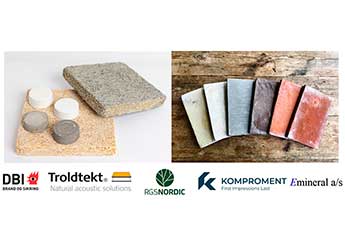Cement is currently the backbone of most construction worldwide, and its production has grown to the extent that it accounts for 7 percent of global CO2 emissions. A more climate-friendly alternative is therefore extremely important for achieving future climate goals. The ReSource project has successfully replaced cement in several building materials in its previous phase by utilizing waste resources through so-called geopolymerization. The project now aims to create the conditions for a coherent, circular value chain across the waste and construction sectors by demonstrating the processing of waste and the production of geopolymer mixes and building materials at a pilot scale.
ReSource focuses on product optimization and the replacement of cement in two specific building materials: Komproment's facade tiles and Troldtekt's acoustic panels.
- In the case of Troldtekt, the goal is to replace the cement content in the company's acoustic panels with a waste-based, geopolymer binder.
- For Komproment, the aim is to create a new facade product where both the binder and aggregates are waste-based.
The geopolymer mix in the ReSource project incorporates upcycled waste products (e.g., sanitary ceramics, bricks, and glass), which are transformed into a binder with up to 80 percent lower CO2 emissions than Portland cement.
Currently, there are several challenges that make it risky and unprofitable to develop alternatives to cement. The project will address a number of critical barriers associated with upcycling waste. Therefore, there is a need to ensure better management of selective demolition and waste streams, develop processing facilities and expertise, and demonstrate examples where waste resources have been effectively used as a validated substitute for cement.
The goal is to develop and demonstrate a cohesive value chain with uniquely developed pilot plants that can pre-treat and blend waste into fractions suitable for the production of geopolymer mixes for use in high-quality building materials.
The project ran from November 2022 to June 2025. It is supported by MUDP – the Ministry of Environment's Development and Demonstration Fund. The project partners are Komproment, Troldtekt, RGS Nordic, Emineral, and the Technical University of Denmark (DTU).

